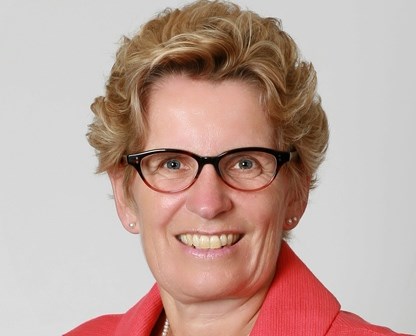The fact Kathleen Wynne’s sexual orientation was barely an issue in her drive to become leader of Ontario’s Liberals is a major milestone for the community, local activists say.
Theresa Burden, chair of Fierte Sudbury Pride, which organizes the annual Gay Pride Parade in the city, says Wynne’s success shows that Canadians are more progressive than people in many other countries.
“The fact that she is the first female premier is almost overshadowed,” Burden said Feb. 1. “And that it’s not even such a big issue shows that we have come a long way in the community ... It says that the barriers are coming down. It says that politics is no longer off limits for us.”
Burden said she’s surprised at how much things have changed and how quickly. She said a combination of a surge of gay characters in U.S. media along with Canadians’ more progressive attitudes have helped changed the way many people view homosexuality.
“We’re on a lot more television shows, and that’s helped us become a lot more mainstream,” she said. “In part, I think it’s because of the American media. Canadians are more progressive, and I think it makes a big impact when we have these issues in our faces all the time on television.”
In Ontario and Canada as a whole, she said a number of laws protecting the gay community have helped positively change everyday life for its members, who are increasingly comfortable about taking their place in mainstream society.
“The law is catching up, with protective rights and such,” she said. “It’s the push the queer community has done to encourage equal rights and acknowledgement. In the U.S., the fight for marriage rights has helped created a lot of awareness. So people have become a lot more accepting because of the awareness.”
When Sudbury’s first pride parade took place in 1997, there was sparse attendance and fears of trouble. In 2012, more than 200 people took part in Sudbury’s event, which was attended by Mayor Marianne Matichuk.
“And the day at (Memorial) Park we held last year was extremely well attended, with the pride flag they fly for us every year at Civic Square,” she said. “We still have a long way to go. There’s still discrimination that happens every day, especially with the younger generation. But we’ve definitely come a long way.”
She said the Gay Straight Alliances the provincial Liberals ordered high schools to create have helped young people in the gay community. While not perfect, for the first time they have a resource to help them as they discover their sexuality.
“Gay Straight Alliances aren’t necessarily a 100-per-cent fix, but they have definitely improved safety in schools for youth,” Burden said.
“Before, if they were being bullied or having trouble, they had no place to go. They had no way to identify or access other queer youths in their schools. Now they can go to the GSAs and have a teacher who is willing to support them.”
Gary Kinsman, a Laurentian University professor and the man who founded Sudbury’s pride parade, said he had mixed feelings about Wynne’s election.
On the phone from the University of Toronto, where he was about to give a talk on sexual diversity studies, Kinsman said Wynne’s success was rooted in decades-long struggles of the entire community.
“That’s what has created the possibility for there to be an openly lesbian premier of Ontario,” Kinsman said. “In that sense, it’s really good. It will open up possibilities for younger queer people.”
But he criticized her for not being a gay rights activist and doubted whether she would “rock the boat” as premier.
“And her government is committed to the implementation of all sorts of policies and regulations and austerity measures that will disadvantage members of the queer community, especially poor people, but also younger people,” he said. “So it’s a double-sided response.
“Obviously, it’s a very good thing, but it rests on the struggles of queer people in the past. And on the other hand, the policies she’s going to enact are going to be to the detriment of the queer community.”
In an interview with Northern Life in January, just before she won the leadership, Wynne said being elected the first openly gay premier was more important for the history books, but it wasn’t what she wants to be remembered for.
“There’s an historical note there, and that’s exciting,” she said. “Yes, I’m a woman. Yes, I’m a lesbian. But I want to be chosen for premier because I’m the best person to do the job.
“It will be a note in the history books, but if I do a great job, that will be a footnote.”
Burden said the most lasting legacy of Wynne’s election may be what it tells young people.
“Kids look to her as a role model. They can say, ‘Hey, look, Kathleen Wynne is premier, she’s really important and she’s a lesbian.’ The kids are going to see that and be able to strive for that, too. It gives them hope.”
If there’s one agenda Burden wishes Wynne would pursue, it’s for more protection of transgendered people. For example, she’d like to see provincial funding for transgender surgeries.
“They are years and years behind the rest of us as far as gaining acceptance goes,” Burden said. “They still have to worry about physical violence. Here in Sudbury, that still happens to them far more often than the rest of us.”
Join Sudbury.com+
- Messages
- Post a Listing
- Your Listings
- Your Profile
- Your Subscriptions
- Your Likes
- Your Business
- Support Local News
- Payment History
Sudbury.com+ members
Already a +member?
Not a +member?
Sign up for a Sudbury.com+ account for instant access to upcoming contests, local offers, auctions and so much more.
